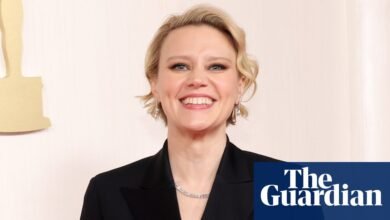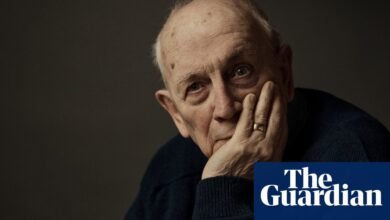The best recent poetry – review roundup | Poetry

An Arbitrary Light Bulb by Ian Duhig (Picador, £12.99)
Among Duhig’s eclectic subjects are his Irish heritage, history, folklore, his home town of Leeds, marginalised figures, social and racial injustices, artists such as Jack B Yeats and Cecilia Vicuña, and poetic influences from Shakespeare to Roddy Lumsden. There is an encyclopedic knowledge and esoteric elusiveness within this book that invites exploration and promises revelation – a mystical hare writing “its own love in white ink on the snow, invisibly … a page awaiting the fall of darkness”. Multifarious and maverick, deeply personal and political, Duhig’s poetic vision alchemises the heart and mind. This is a brilliant collection from a balladeer of our times, a poet who stands for the people, always with a sense of compassion, humility and wry humour.
What the Earth Seemed to Say: New & Selected Poems by Marie Howe (Bloodaxe, £14.99)
This rich and luminous compilation draws from four previous collections, including the hauntingly elegiac What the Living Do (1997), a tribute to Howe’s brother, who died as a result of Aids, and Magdalene (2017), an intense exploration of womanhood. It opens with a bounteous selection of new work. In response to our present-day crises, the speaker asks: “Are you willing to take your place in the forest again? / To become loam and bark, to be a leaf falling from a great height, / to be the worm who eats the leaf, / and the bird who eats the worm?” Howe’s poems carry an emotional depth and transcendent simplicity. There is a simultaneous earthliness and spirituality in her musings on the metaphysical revelations of the divine, the sacred and the eternal. As the book concludes: “Often I’m lonely. / Sometimes a joy pours through me so immense.”
Collected Poems by Mimi Khalvati (Carcanet, £30)
A stunning compendium covering 33 years and eight collections, from 1991’s In White Ink to 2019’s Afterwardness, as well as uncollected poems. Khalvati was born in Iran but sent to boarding school in England at six, and her work often engages with the sense of “a lyric void beyond the finite / and knowable”. She explores the loss of one’s native country, culture and mother tongue; the yearning “to understand the nature / of story / how to prime a palimpsest / for all successive stories”, as well as universal themes of childhood, coming of age and motherhood. This generous, expansive volume affirms Khalvati’s place as one of the UK’s most accomplished lyric poets.
Ceremony for the Nameless by Theresa Lola (Penguin, £10.99)
Following an excellent debut, the former young people’s laureate for London celebrates “the power of a name to bring beings to life. / The power to stop them from dying” through a myriad of perspectives – her dual Nigerian-British identity, Yoruba culture, faith, personal and collective public memories, married life, encounters with friends and racism, dreams. There is a bold immediacy and striking grace to Lola’s writing, rendering it accessible and memorable. The book charts a victorious journey of transformation, where the speaker proclaims: “I am reclaiming that un-choreographable desire I had.” Her poems have a joyfulness and inherent musicality: “Henceforth I’ll sing my own name, / let it spring from my mouth, / stretch into a long string of phrases, / listen out for the harmony of echoes. / I’ll dance like the future is watching.” This book assures her place as a trailblazer for a new wave of poets.
Girl by Ruth Padel (Chatto & Windus, £12.99)
A sensual exploration of two female archetypes: the Virgin Mary, vividly imagined as “a woman fainting at the back of a crowd / while her son staggers to earth under an enormous cross”, and the Cretan “snake goddess”, evoked as “the spell of woman”. Padel’s lucid and intellectual poems traverse a spiritual quest through ancient mythology, mysticism, European fairytales, “places I’ve found sacred in my life”, to articulate “the wonder … of being a girl”, “where a girl / can find clarity on who she is”. The mythical framework is interspersed with fragments from the poet’s own life, and memories of being a mother, daughter and a girl herself. Padel reminds us that “there is always the question of power / and girl is a trajectory / of learning how to deal with it”. A rhapsodic work.
Source link



